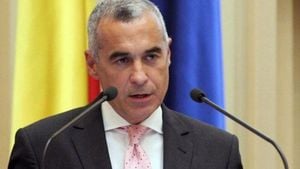Truong My Lan, the Vietnamese real estate tycoon, faces the harrowing reality of needing to raise $9 billion to stave off execution after appealing her death sentence linked to the world’s largest banking fraud.
On December 3, 2024, the High People’s Court of Ho Chi Minh City upheld the death sentence of Truong, the chairwoman of the Van Thinh Phat Group, following her conviction for embezzlement and bribery totaling over $12 billion, which amounts to approximately 3% of Vietnam’s GDP for 2022. Her involvement was tied to fraudulent practices at the Saigon Commercial Bank where she reportedly controlled operations through shell companies to withdraw substantial sums over many years.
The court’s decision marks another significant chapter in Vietnam’s extensive anti-corruption efforts, branded “Blazing Furnace”, which have resulted in numerous high-profile convictions. The prosecutors described Lan's actions as causing unprecedented harm not only to the financial institution involved but also to the broader economy and public trust.
During her trial earlier this year, the evidence established her as the ringleader of this massive scheme, which resulted in serious financial destabilization and significant state intervention, costing the government billions to prevent widespread banking panic. Her sentence was particularly startling, as it is rare for women to receive capital punishment for white-collar crimes in the nation’s history.
The court ruling, reinforcing her death sentence, indicated she still has avenues available to seek leniency through repayment. Under Vietnamese law, if she manages to repay at least 75% of the funds misappropriated, her death sentence could be commuted to life imprisonment. This statutory relief hinges on her ability to produce $9 billion.
Truong's legal team is currently scrambling to find solutions to her dire financial predicament. They assert she holds assets exceeding the restitution amount required; many of these holdings are tied up in real estate, which takes time and effort to liquidate. Nguyen Huy Thiep, her lawyer, emphasized the challenges she faces due to her death sentence, stating it complicates negotiations for selling her properties effectively and for favorable prices.
She has also reached out to friends seeking loans to help her raise the colossal sum required as the clock ticks against her potential execution. The continuous freeze on all identified assets—over 1,000 linked to the fraud—complicates matters significantly, limiting her options for swift liquidation. The authorities have taken such measures to prevent any potential flight of capital or attempts to dissipate her holdings.
Born during the tumultuous period of Vietnam's economic reforms, Truong My Lan initially rose from humble beginnings as a market vendor selling cosmetics alongside her mother to amass substantial wealth and influence. Her real estate empire flourished after the Communist government introduced market reforms, allowing private enterprises to thrive.
Throughout the years, she has been affiliated with luxurious hotels and significant real estate projects across Vietnam, solidifying her status as one of the more powerful figures within the country’s economy prior to her arrest. Yet, her fall from grace has been dramatic and swift; she, along with numerous associates and family members—including her husband and niece—was implicated and charged, leading to widespread convictions across the board of those involved with the fraudulent activities.
After losing her appeal, Truong expressed regret, stating she felt embarrassed for becoming such a burden to the state and insisted her main focus is to repay her debts. The pressure is mounting, and the stakes could not be higher as she races against time, trying to salvage her life from the death sentence looming over her.
Death penalties in Vietnam are seldom publicized, and there are significant delays before executions are carried out. Nevertheless, the clock is ticking on Truong My Lan’s prison term as she endeavors to assemble the necessary funds to save her life. If she can recover the $9 billion needed to satisfy the court’s requirements, it will most likely secure her freedom, albeit with the heavy burden of previous actions weighing on her future.
This unprecedented case raises questions not just about individual accountability but also about the broader socio-economic structures and the standards of governance within Vietnam. The public remains starkly divided; some have voiced calls for stringent anti-corruption measures to protect the integrity of financial systems, whereas others argue the legal system must also show compassion where remorse and restitution are evident.
With both local and international attention focused on her case, the outcome of Lan’s endeavor to raise the substantial sum of money may serve as a litmus test for Vietnam’s justice system and its approach toward handling corporate fraud and executive accountability.
For the moment, Truong is caught between the clutches of her past misdeeds and the uncertain possibility of redemption through financial restitution—the outcome of which remains to be seen but promises to have enduring consequences on her life and the perception of justice within Vietnam.



